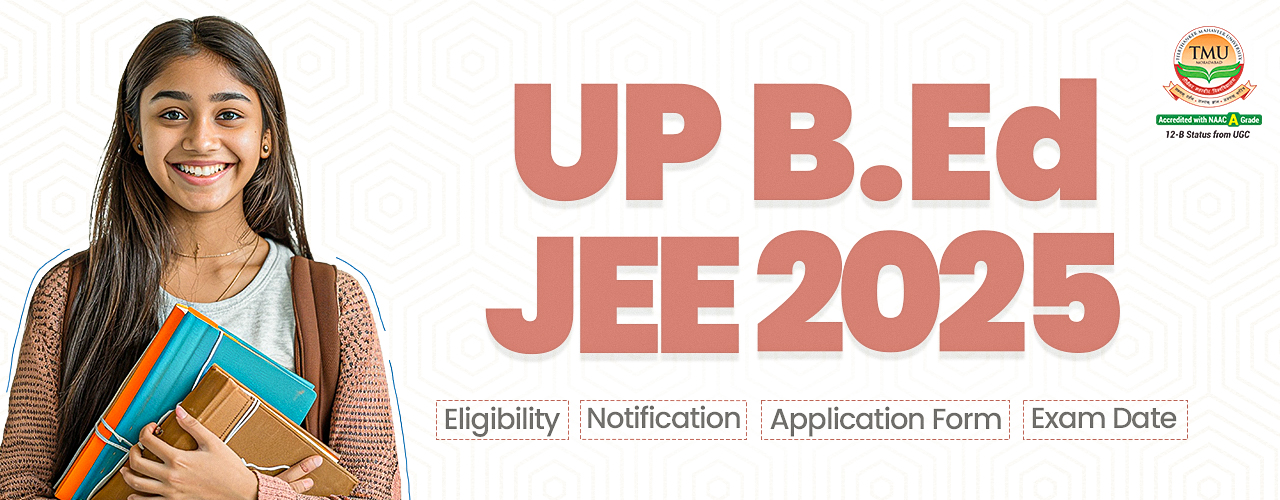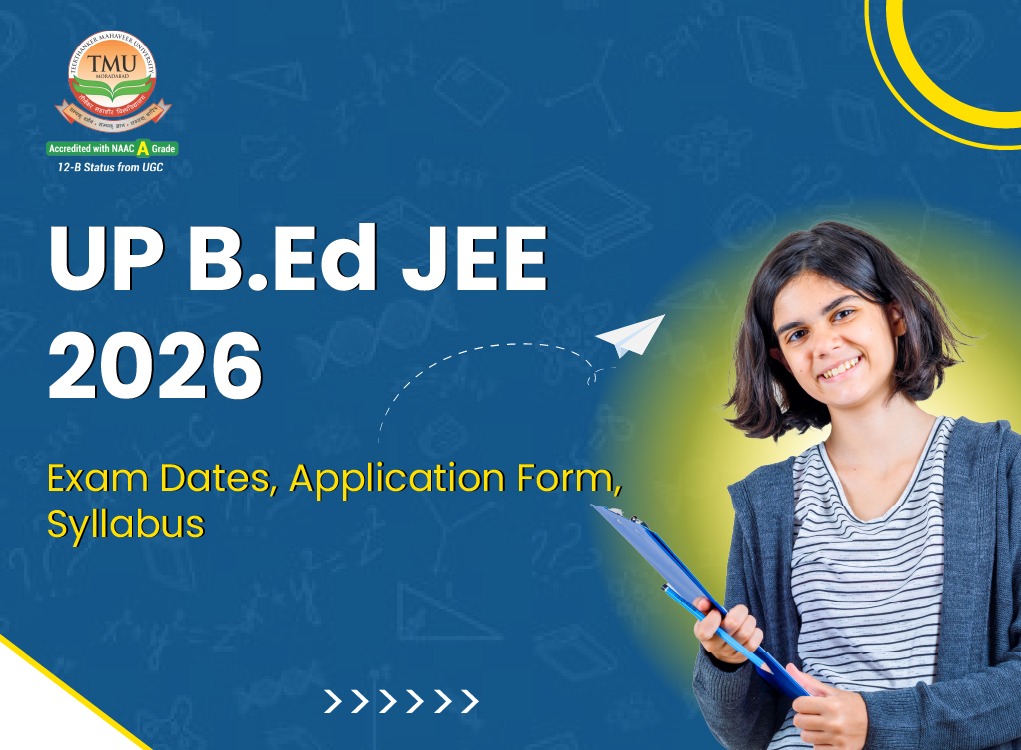UP B.Ed JEE 2025: Eligibility, Notification, Application Form, Exam Date
Table of Contents
If you are aspiring to become a teacher in Uttar Pradesh, the UP B.Ed. JEE 2025 is your gateway. This joint entrance examination is essential for pursuing a B.Ed. (Bachelor of Education) degree. The UP B.Ed. JEE exam is an important step for anyone aiming to enter the field of teaching in Uttar Pradesh, and it's conducted once a year.
In this article, we’ll walk you through everything you need about the UP B.Ed. JEE 2025, including the eligibility criteria, application process, important dates, and much more.
UP B.Ed JEE 2025 is a state-level entrance exam designed for aspiring teachers seeking admission to Bachelor of Education (B.Ed) programs across colleges and universities in Uttar Pradesh.
The exam is conducted annually by a designated university to assess candidates' aptitude, general knowledge, language skills, and subject-specific knowledge. Clearing this exam opens the door to prestigious government and private B.Ed. colleges in Uttar Pradesh.
In this article, we’ll walk you through everything you need about the UP B.Ed. JEE 2025, including the eligibility criteria, application process, important dates, and much more.
What is UP B.Ed JEE?
The UP B.Ed Joint Entrance Exam (JEE) is a state-level examination conducted for admission to the B.Ed program at various colleges and universities in Uttar Pradesh. This exam is essential for those who wish to teach in schools across the state, as the B.Ed degree is a mandatory qualification for teaching at the elementary and secondary education levels.
The exam is organized by Mahatma Jyotiba Phule Rohilkhand University, Bareilly, and is recognized by the state government.
Teerthanker Mahaveer University
Apply for Admission
Click Here To Apply for Admission
UP B.Ed JEE 2025: Key Highlights
| Feature | Details |
| Exam Name | UP B.Ed. Joint Entrance Examination |
| Conducting Authority | Bundelkhand University (BU), Jhansi |
| Exam Level | State-Level |
| Application Mode | Online |
| Exam Mode | Offline (Pen and Paper-Based) |
| Exam Frequency | Annual |
| Duration | 3 Hours |
| Official Website | https://bujhansi.ac.in/ |
Eligibility Criteria
Before applying for UP B.Ed. JEE 2025, ensure you meet the eligibility requirements. These are:
Educational Qualifications
- For General and OBC Candidates: A bachelor's degree or master's degree with at least 50% marks from a recognized university.
- For SC/ST Candidates: A bachelor's degree with a minimum of 45% marks.
- Specialization Requirements: Candidates with a B.Tech or B.E. degree must have at least 55% marks with Mathematics and Science as core subjects.
Age Limit
- There is no upper age limit; however, candidates must be at least 21 years old.
Nationality
- Applicants must be Indian citizens. Non-residents of Uttar Pradesh may apply under the General category.
UP B.Ed JEE 2025 Application Process
The application process for UP B.Ed JEE 2025 is entirely online. Follow these steps:
How to Apply Online
- Visit the official website once the application link is active.
- Register with your basic details to create a unique login ID and password.
- Fill out the application form with accurate information.
- Upload scanned copies of your photograph, signature, and other required documents.
- Pay the application fee online using a debit card, credit card, or net banking.
Required Documents
- Recent passport-sized photograph
- Scanned signature
- Educational certificates
- Caste certificate (if applicable)
- Domicile certificate
Application Fee
| Category | Application Fee | Application With Late Fee |
| General/OBC | ₹1,400 | ₹2,000 |
| SC/ST | ₹700 | ₹1,000 |
| Other State Candidates (all categories) | ₹1,400 | ₹2,000 |
Exam Date and Schedule
The tentative schedule for UP B.Ed. JEE 2025 is as follows:
| Event | Date (Tentative) |
| Notification Release | January 2025 |
| Application Start Date | February 2025 |
| Application End Date | March 2025 |
| Admit Card Release | April 2025 |
| Exam Date | May 2025 |
| Result Declaration | 16 June 2025 |
| Counselling Process | July-August 2025 |
UP B.Ed JEE 2025 Exam Pattern
The UP B.Ed JEE 2025 exam is structured to evaluate a candidate's general knowledge, language proficiency, aptitude, and subject-specific understanding. The examination is divided into two papers: Paper 1 and Paper 2. Both papers are compulsory, and each paper tests distinct areas of knowledge and skills.
Exam Pattern for Paper 1
Paper 1 is designed to assess the candidate's general knowledge and language proficiency. Below is the detailed structure:
| Subject | Number of Questions | Marks | Types of Questions | Duration |
| General Knowledge (GK) | 50 | 100 | Multiple-Choice Questions | 3 Hours |
| Language (Hindi/English)* | 50 | 100 | Multiple-Choice Questions | |
| Total | 100 | 200 |
Key Points for Paper 1:
- Language Choice: Candidates must choose between Hindi and English for the language section.
- Marking Scheme: Each question carries 1 mark and -0.33 for an incorrect answer.
- Focus Areas:
- General Knowledge: Includes current affairs, history, geography, general science, and more.
- Language: Tests grammar, vocabulary, comprehension, and sentence formation.
Exam Pattern for Paper 2
Paper 2 evaluates the candidate's aptitude for teaching and their understanding of the subject they have chosen based on their educational background.
| Subject | Number of Questions | Marks | Type of Questions | Duration |
| General Aptitude | 50 | 100 | Multiple-Choice Questions | 3 Hours |
| Subject-Specific Ability** | 50 | 100 | Multiple-Choice Questions | |
| Total | 100 | 200 |
Key Points for Paper 2:
- Subject-Specific Section: Candidates need to choose their subject specialization, typically aligned with their graduation stream (e.g., Science, Commerce, Arts).
- Marking Scheme: Similar to Paper 1, each question awards 1 mark and -0.33 for an incorrect answer.
- Focus Areas:
- General Aptitude: Logical reasoning, numerical ability, and problem-solving.
- Subject-Specific Ability: Deep understanding of the subject selected by the candidate.
Comparison Between Paper 1 and Paper 2
| Aspect | Paper 1 | Paper 2 |
| Focus Areas | General Knowledge & Language Proficiency | General Aptitude & Subject Ability |
| Question Types | MCQs | MCQs |
| Marks Distribution | 200 marks (100 for each section) | 200 marks (100 for each section) |
| Duration | 3 Hours | 3 Hours |
| Language Option | Hindi or English | Subject-specific |
UP B.Ed JEE 2025 Syllabus Overview
The UP B.Ed JEE 2025 syllabus is designed to test candidates on a wide range of subjects to ensure their aptitude and readiness for a career in teaching. The syllabus is divided into two parts, corresponding to Paper 1 and Paper 2, with each focusing on different areas of knowledge and skills.
Syllabus for Paper 1
1. General Knowledge (GK)
This section aims to test the candidate's awareness of current events and general facts about the world, India, and Uttar Pradesh. Key topics include:
- History: Indian and World History, Ancient and Modern India.
- Geography: Indian geography, climate, rivers, and natural resources.
- Current Affairs: National and International events, government schemes.
- Polity: Indian Constitution, political system, governance, and public policies.
- Science: General science, discoveries, and inventions.
- Economy: Indian economy, budget, and economic development.
2. Language (Hindi/English)
This section assesses language proficiency. Candidates must choose between Hindi and English.
For Hindi Language
- Hindi grammar and composition
- Synonyms and antonyms
- Sentence correction
- One-word substitution
- Idioms and phrases
- Reading comprehension
For English Language
- Grammar: Parts of speech, tenses, articles
- Vocabulary: Synonyms, antonyms, idiomatic expressions
- Sentence correction
- Fill in the blanks
- Reading comprehension and passage-based questions
Syllabus for Paper 2
1. General Aptitude
This section evaluates the candidate’s logical reasoning, numerical ability, and overall problem-solving skills. Key topics include:
- Logical Reasoning: Series, analogies, syllogisms, puzzles.
- Numerical Ability: Arithmetic, percentages, profit and loss, averages.
- Mental Ability: Decision-making, classification, coding-decoding, blood relations.
2. Subject-Specific Ability
Candidates must choose their subject specialization based on their educational background. This section tests in-depth knowledge of the chosen subject.
Subjects Offered
- Arts Stream: History, Political Science, Sociology, Geography.
- Science Stream: Physics, Chemistry, Biology, Mathematics.
- Commerce Stream: Accounting, Business Studies, Economics.
- Agriculture: Agricultural Sciences, Soil Science, Animal Husbandry.
Preparation Tips for UP B.Ed JEE 2025 Syllabus
- Create a Study Plan: Dedicate time to each section and stick to a consistent schedule.
- Focus on Strengths: Prioritize subjects you are confident in but improve weaker areas simultaneously.
- Practice Previous Papers: Solve past years' question papers and take mock tests to familiarize yourself with the exam pattern.
- Stay Updated: Read newspapers, watch current affairs programs, and follow online updates to stay informed.
- Revise Regularly: Review key concepts and formulas periodically to ensure retention.
Participating Universities
Some of the top universities participating in UP B.Ed JEE include:
- University of Lucknow
- Dr. Bhimrao Ambedkar University, Agra
- Mahatma Jyotiba Phule Rohilkhand University, Bareilly
- Chhatrapati Shahu Ji Maharaj University, Kanpur
UP B.Ed. JEE Result 2025
Bundelkhand University has officially declared the UP B.Ed. JEE Result 2025 today, June 16, 2025. Candidates who appeared for the entrance exam can now access their scorecards on the official website bujhansi.ac.in using their user ID and password.
Along with the result, the cut-off marks, merit list, and counselling schedule are also expected to be released soon.
UP B.Ed. JEE Result 2025 – Key Highlights
| Key Details | Information |
| Exam Name | UP B.Ed. Joint Entrance Examination (JEE) 2025 |
| Conducting Authority | Bundelkhand University, Jhansi |
| Exam Dates | June 1 and June 5, 2025 |
Result Declaration | June 16 2025 |
| Official Website | bujhansi.ac.in |
| Credentials Required | User ID and Password |
| Expected Cut-Off (General) | 65 – 75 Marks |
| Expected Cut-Off (OBC) | 60 – 70 Marks |
| Expected Cut-Off (SC/ST) | 55 – 60 Marks |
| Post-Result Process | Merit List & Counselling Schedule Announcement |
Conclusion
UP B.Ed JEE 2025 is a stepping stone for aspiring educators. With proper preparation and awareness of the process, you can secure admission to a prestigious B.Ed program. Be sure to adhere to the application timelines and start your preparation early for success.
FAQs
Q1: What is the UP BEd jee exam?
Ans: The UP B.Ed JEE (Uttar Pradesh Bachelor of Education Joint Entrance Examination) is a state-level entrance exam conducted annually for admission into Bachelor of Education (B.Ed) programs in various universities and colleges across Uttar Pradesh. It tests candidates' general knowledge, language proficiency, teaching aptitude, and subject-specific skills to determine their eligibility for teacher training courses.
Q2: Can I apply if I’m in the final year of my graduation?
Ans: Yes, final-year students can apply, but they must produce their graduation certificate at the time of counselling.
Q3: Is there any relaxation in the application fee for female candidates?
Ans: No, there is no relaxation specifically for female candidates.
Q4: What is the minimum qualifying percentage for General category candidates?
Ans: General category candidates need a minimum of 50% in their graduation or post-graduation.
Q5: How much rank is required for UP B.Ed. government college?
Ans: To secure admission in a government college through UP B.Ed JEE, a rank within the top 2,000 to 5,000 is generally required, depending on the category, college preferences, and seat availability. However, for top-tier government colleges, a rank under 1,000 is often preferred. Reservation policies may further influence the cutoff.















